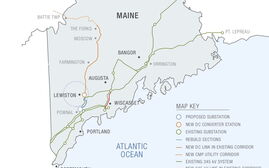Processing Your Payment
Please do not leave this page until complete. This can take a few moments.
- News
-
Editions
View Digital Editions
Biweekly Issues
- December 1, 2025
- Nov. 17, 2025
- November 03, 2025
- October 20, 2025
- October 6, 2025
- September 22, 2025
- + More
Special Editions
- Lists
- Viewpoints
-
Our Events
Event Info
Award Honorees
- Calendar
- Biz Marketplace
CMP: Bill to create consumer-owned utility amounts to 'hostile takeover'
 Photo / New England Clean Energy Connect
A bill that would create a consumer-owned power company to “restore local ownership and control of Maine’s power delivery systems” received strong support from disgruntled ratepayers at Tuesday’s public hearing but was challenged by Central Maine Power as a constitutionally questionable proposal that would reduce grid investment and reliability.
Photo / New England Clean Energy Connect
A bill that would create a consumer-owned power company to “restore local ownership and control of Maine’s power delivery systems” received strong support from disgruntled ratepayers at Tuesday’s public hearing but was challenged by Central Maine Power as a constitutionally questionable proposal that would reduce grid investment and reliability.
A bill that would create a consumer-owned power company to “restore local ownership and control of Maine’s power delivery systems” received strong support from disgruntled ratepayers at Tuesday’s public hearing but was challenged by Central Maine Power as a constitutionally questionable proposal that would reduce grid investment and reliability.
Following the hearing on LD 1646 before the Committee on Energy, Utilities and Technology, CMP President and CEO Doug Herling issued a statement that left no uncertainty about the state’s largest electric utility's stance on the bill co-sponsored by Rep. Seth Berry, D-Bowdoinham, and Senate President Troy Jackson, D-Aroostook.
“The Maine Power Delivery Authority bill, LD 1646, proposes to seize private company assets that are not for sale and put them into the public domain; there are serious constitutional questions about this proposal and the business community should be concerned about this precedent,” Herling stated. “Maine people should also question how a public body can dedicate the necessary investment and the daily operating knowledge to manage electric service in Maine.”
Herling reminded lawmakers that the Legislature had considered similar bills in the past that would seize portions of the assets of investor-owned utilities, but in each instance, he said, “the Legislature has rejected such proposals in light of the highly questionable benefits and the certain legal and constitutional challenges.”
“The business of daily electric transmission and delivery is complex, dangerous and requires knowledge and expertise,” Herling stated. “Maine people deserve to be served by knowledgeable professionals with experience and skills, and not by a consultant and an oversight Board selected purely on the basis of where members live. For nearly a decade, Maine has benefited from annual CMP investment of over $300 million in assets and infrastructure — a six-fold increase since CMP became part of the Iberdrola group. In fact, over 100% of CMP’s earnings during this period have been reinvested in the Maine electric grid.”
How much would it cost?
LD 1646 does not specify what it would cost to create a public-owned utility controlling the transmission and distribution assets of CMP and Emera Maine.
If approved and signed into law by Gov. Janet Mills, it calls on the Maine Public Utilities Commission to “examine all laws” that might need to be changed as well as laws “relating to investor-owned transmission and distribution utilities that may be eliminated as a result of this Act.” PUC would be charged with reporting its findings and submitting proposed legislation to the Joint Standing Committee on Energy, Utilities and Technology no later than Jan. 15, 2020.
Bangor Daily News reported that 2017 financial figures filed with the PUC indicate the combined value of CMP and Emera Maine would be approximately $4.5 billion.
But Verrill Dana attorney Jim Cohen told BDN the cost would likely be much higher, estimating it could range between $7 billion and $9 billion, in part due to the pending sale of Emera to ENMAX Corp. of Calgary. As reported by Mainebiz in March, Emera’s parent company, Halifax-based Emera Inc., announced it has agreed to sell its interest in Emera Maine to ENMAX Corp. for $1.3 billion in U.S. currency, a purchase price that includes $959 million in shares and approximately $341 million in assumed debt.
Comments pro and con
Most of the written submissions from ratepayers supporting the bill cite ongoing frustrations with CMP over customer service and what they characterize as high service bills.
Herling acknowledged that over the past 18 months CMP has fallen short of meeting customer expectations, but noted the utility has responded by “hiring more customer service staff, improving training and oversight, and [has] plans to increase our field operations staff.”
“The Maine people working at CMP are dedicated to improving performance across the board and regaining customer trust,” he said in his written statement. “With more than 120 years of experience operating electric transmission and distribution over 11,000 square miles in Maine, it is hard to see how a state-owned utility could have the experience and industry insight to successfully operate a complex utility, not to mention the financial means to consistently invest millions in infrastructure improvements. Maine deserves better.”
But John Costin, owner of Veneer Services Unlimited and a member/manager of New Pioneer LLC, testified in favor of LD 1646, citing his experiences in moving his custom working business in Kennebunk, where his power was supplied by the consumer-owned Kennebunk Light and Power, to Sanford, where he became a customer of CMP.
“The difference was shocking, if you will pardon the pun,” he wrote. “Before I moved, other businesspeople warned me about poor service and high cost from Central Maine Power, but I had no way to know whether their complaints were merited. After two years, I can verify that they were.”
Costin said nothing about the business changed other than “the location and the power source,” but his total cost per-kilowatt-hour went up “nearly two-and-a-half times as much as it did from the consumer-owned utility.”
“I can tell you that no business owner in their right mind would willingly buy from a vendor charging that much more than another for the same product,” he wrote. “But we do not have a choice when it comes to our electric utility. I wish that we did, and we would not choose CMP. But CMP is not only inferior when it comes to price. Service has been one headache after another, with no clear explanation.”
Mark Thibodeau, regional manager for ReEnergy Biomass Operations LLC, which owns four biomass power facilities in Maine, with two of them operating at this time in Livermore Falls and Stratton, said his company is “intrigued” by the concept of a “consumer-owned transmission and distribution utility that would serve the areas in Maine not already served by consumer-owned utilities.”
“We agree that this approach could indeed improve affordability, reliability, and accountability,” he wrote. “Because this change would be a dramatic one, we agree with others that a comprehensive study on this concept may be helpful. We look forward to learning more about this concept.”
Matthew Marks, CEO of Associated General Contractors of Maine, testified against the bill, citing what his trade group sees as significant stumbling blocks in the proposed state-takeover of the investor-owned utilities.
Among them, Marks wrote:
- "The timeline indicates the Maine Power Delivery Authority will have one year to purchase all public utilities of investor-owned transmission and delivery systems. However, given that this is most likely a hostile takeover, the legal challenges could last much longer than expected and place residents and businesses at risk. A lengthy legal battle would certainly curb investment in a market that is primed for renewable energy development.
- "This bill itself could create apprehension in transmission and distribution investment that is outside the scope of PUC-mandated minimum service during a time of power generation growth in Maine.
- "The mission of the Maine Power Delivery Authority includes ‘lowest possible cost,’ which may contradict improvements or maintenance in the best interest of the consumer depending on the interpretation of the term ‘lowest possible cost.’
- "We are deeply concerned with the transition from tax payments on utility owned infrastructure to a payment in lieu of taxes. Many of the towns recognized the tax benefit of expansion and under this new model that would not be guaranteed. It would undoubtedly provide a disincentive for future development. Currently, the utilities pay nearly $40 million in state taxes, which would be removed from the general fund.
- "Under this model, the employees would be “privatized,” and the bidding contractor would be forced to retain the existing non-exempt employees of the utilities. We have many questions regarding the risk of assuming the liabilities of another company, and the direction to keeping the employees for five years after operations commence. In our reading of this bill, it would not allow termination until that five-year threshold is met. It doesn’t address the demands of the new contractors responding to emergencies and how the entity would compel workers to comply with new policies or even respond.”
Marks also questioned about how a new consumer-owned utility would operate in such a large state, wondering if bids would be solicited for the entire state or separated by regions?
“In both cases,” he wrote, “the complexity of the bidding document will have to be reviewed by the Maine PUC’s technical staff, in our opinion, to ensure consistency of service. This could inadvertently place delivery of power in Maine at risk, along with the opportunity to expand our renewable energy capacity.”
Marks encouraged members of the committee to “oppose this bill as written and ask for a more thorough review of this concept before moving ahead.”
Mainebiz web partners
Related Content

The Giving Guide
The Giving Guide helps nonprofits have the opportunity to showcase and differentiate their organizations so that businesses better understand how they can contribute to a nonprofit’s mission and work.
Learn More
Work for ME
Work for ME is a workforce development tool to help Maine’s employers target Maine’s emerging workforce. Work for ME highlights each industry, its impact on Maine’s economy, the jobs available to entry-level workers, the training and education needed to get a career started.
Learn More
Groundbreaking Maine
Whether you’re a developer, financer, architect, or industry enthusiast, Groundbreaking Maine is crafted to be your go-to source for valuable insights in Maine’s real estate and construction community.
Learn more-
The Giving Guide
The Giving Guide helps nonprofits have the opportunity to showcase and differentiate their organizations so that businesses better understand how they can contribute to a nonprofit’s mission and work.
-
Work for ME
Work for ME is a workforce development tool to help Maine’s employers target Maine’s emerging workforce. Work for ME highlights each industry, its impact on Maine’s economy, the jobs available to entry-level workers, the training and education needed to get a career started.
-
Groundbreaking Maine
Whether you’re a developer, financer, architect, or industry enthusiast, Groundbreaking Maine is crafted to be your go-to source for valuable insights in Maine’s real estate and construction community.
ABOUT
NEW ENGLAND BUSINESS MEDIA SITES
No articles left
Get access now
In order to use this feature, we need some information from you. You can also login or register for a free account.
By clicking submit you are agreeing to our cookie usage and Privacy Policy
Already have an account? Login
Already have an account? Login
Want to create an account? Register
Get access now
In order to use this feature, we need some information from you. You can also login or register for a free account.
By clicking submit you are agreeing to our cookie usage and Privacy Policy
Already have an account? Login
Already have an account? Login
Want to create an account? Register











2 Comments